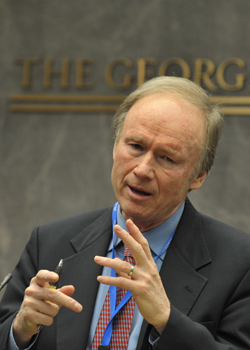What is the Right Legal Regime?
In the third panel of the conference—“What is the Right Legal Regime?”—speakers examined how the law should best respond to the need to protect privacy while realizing the benefits of tracking technologies. Panelists addressed the question, What combination of constraint and facilitation is the right one in the Web 3.0 world?
Professor Henry Perritt addressed specific concerns on the topic of law and privacy in technology.
As technologies change, Perritt observed, the accompanying risks change as well. Geo-location and other advanced technologies don’t just reveal our actions and locations—they reveal something fundamental about who we are and have the potential to exploit what lies at the center of our personhood. Given this fact, Perritt argued, it is government surveillance, and not commercial advertising, that poses the greatest invasive threat to our personal liberty.
Contrary to traditional opinions, the government’s access to our communications transactions is more harmful than its access to our communications content. Surveillance tools like traffic analysis can track a person’s Internet history and other data like his human associations, subject matter interests, and physical location. These pattern analyses can reveal more about a person’s behavior than the actual content of emails or phone calls.
The proliferation of this personal transaction data increases the need to securely protect against cyberterrorism threats online. However, government monitoring of possible cyberthreats becomes as problematic as the cyberthreats themselves, as the government imposes technological controls that subject everyone to intrusive surveillance. This type of activity creates an atmosphere of paranoia and suspicion injurious to personal liberty.
Professor Perritt also offered thoughts on the role of law in protecting privacy. Certain proposed legislative measures, like the Cyber Intelligence Sharing and Protection Act (CISPA), represent the wrong approach to privacy protection. CISPA sought to make it easier for the private sector to disclose data to the federal government; if passed, the act would have weakened cybersecurity and made it easier for the government to engage in invasive surveillance. Equally troubling, CISPA granted broad immunity to the private sector. Perritt suggested that accountability measures be put in place for the government and for private corporations to protect against exploitation of privacy. For instance, expanded conditions for judicial intervention would limit the government’s ability to acquire personal transactional information. Also, enhancing tort liability for marketplace corporations who fail to implement the best security practices with personal data would create tighter security and would offer more effective protection against cyberattacks.
Visit Professor Perritt’s Bepress and SSRN pages to read more of his scholarship on technology and privacy, including “The Internet at 20: Evolution of a Constitution for Cyberspace.”
Professor Perritt is the author of Digital Communications Law (Aspen Publishers: 2012), one of the leading treatises on Internet law.



Leave a Reply